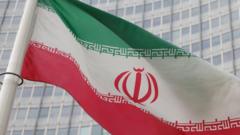The International Atomic Energy Agency (IAEA) has issued a warning concerning Iran's nuclear compliance for the first time in two decades, prompting fears of escalating tensions and regional instability.
Iran's Nuclear Compliance Under Scrutiny: IAEA Raises Alarm

Iran's Nuclear Compliance Under Scrutiny: IAEA Raises Alarm
The international watchdog's findings signal potential repercussions for Iran's nuclear activities.
Amid heightened concerns, the International Atomic Energy Agency (IAEA) has reported that Iran is not fulfilling its non-proliferation obligations. This alarming development marks a significant turning point, as Iran faces the possibility of being referred to the UN Security Council due to its lack of cooperation and undisclosed nuclear activities. The board of governors of the IAEA passed a resolution underscoring these issues, following a damning report that highlighted discrepancies in Iran’s compliance.
Iran’s foreign minister has cautioned European nations that their support for this resolution would be a serious strategic error, promising a robust response from Tehran. This comes at a time when U.S.-Iran relations are fraught, especially with ongoing negotiations for a renewed nuclear agreement. Additionally, just a day after the IAEA report, the U.S. government advised some citizens to leave the Middle East amidst fears of potential military strikes by Israel on Iranian nuclear facilities.
In defense of its nuclear pursuits, Iran has consistently maintained that its activities are peaceful and denies any intention of developing nuclear weapons. However, the country has been increasingly defiant in the wake of sanctions reinstated after the U.S. withdrew from the 2015 nuclear deal, which had aimed to limit Iran's nuclear program in exchange for the lifting of economic restrictions.
Notably, the latest IAEA findings revealed that Iran had amassed over 408kg (900lb) of uranium enriched to 60% purity—a concerning threshold that could yield enough material for nine atomic bombs. This escalating situation calls into question the stability of nuclear negotiations and the overall security in the Middle East region.
Iran’s foreign minister has cautioned European nations that their support for this resolution would be a serious strategic error, promising a robust response from Tehran. This comes at a time when U.S.-Iran relations are fraught, especially with ongoing negotiations for a renewed nuclear agreement. Additionally, just a day after the IAEA report, the U.S. government advised some citizens to leave the Middle East amidst fears of potential military strikes by Israel on Iranian nuclear facilities.
In defense of its nuclear pursuits, Iran has consistently maintained that its activities are peaceful and denies any intention of developing nuclear weapons. However, the country has been increasingly defiant in the wake of sanctions reinstated after the U.S. withdrew from the 2015 nuclear deal, which had aimed to limit Iran's nuclear program in exchange for the lifting of economic restrictions.
Notably, the latest IAEA findings revealed that Iran had amassed over 408kg (900lb) of uranium enriched to 60% purity—a concerning threshold that could yield enough material for nine atomic bombs. This escalating situation calls into question the stability of nuclear negotiations and the overall security in the Middle East region.





















